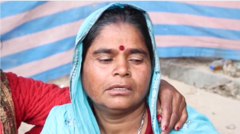A 20-day-old baby girl who was found buried alive in the northern Indian state of Uttar Pradesh is fighting for survival, hospital authorities say. She was discovered by chance when a shepherd, who had taken his goats to the area for grazing, heard faint cries coming from under a mound of earth. When he approached, he saw a tiny hand sticking out of the mud. Upon alerting the villagers, police were called to the scene and successfully dug the baby out.
Police have not identified any suspects yet, but incidents of abandonment and infanticide are often linked to India's prevailing preference for sons, exacerbating the country's already skewed gender ratio. The incident occurred in Shahjahanpur district, where the baby is currently being treated in the neonatal intensive care unit of a government-run medical college and hospital.
Medical college principal Dr. Rajesh Kumar reported that when the infant was brought in, she was covered in dirt, gasping for air as mud filled her mouth and nostrils. “She was in a critical condition, showing signs of hypoxia,” he stated. Despite a minor improvement after 24 hours, her situation worsened due to developing an infection.
A multi-disciplinary team of doctors is attempting to treat her, as records indicate she was likely buried shortly after birth, suggested by the freshness of her wounds. Investigators are still trying to locate the baby's parents, while the child helpline has also been informed.
This incident is not isolated; similar stories have emerged in India where cultural biases against female children lead to cases of infanticide and abandonment. With one of the worst gender ratios globally, many female fetuses face illegal termination or abandonment after birth. Advocacy groups highlight the severe discrimination against women, linking it to long-standing societal preferences for male children.
Police have not identified any suspects yet, but incidents of abandonment and infanticide are often linked to India's prevailing preference for sons, exacerbating the country's already skewed gender ratio. The incident occurred in Shahjahanpur district, where the baby is currently being treated in the neonatal intensive care unit of a government-run medical college and hospital.
Medical college principal Dr. Rajesh Kumar reported that when the infant was brought in, she was covered in dirt, gasping for air as mud filled her mouth and nostrils. “She was in a critical condition, showing signs of hypoxia,” he stated. Despite a minor improvement after 24 hours, her situation worsened due to developing an infection.
A multi-disciplinary team of doctors is attempting to treat her, as records indicate she was likely buried shortly after birth, suggested by the freshness of her wounds. Investigators are still trying to locate the baby's parents, while the child helpline has also been informed.
This incident is not isolated; similar stories have emerged in India where cultural biases against female children lead to cases of infanticide and abandonment. With one of the worst gender ratios globally, many female fetuses face illegal termination or abandonment after birth. Advocacy groups highlight the severe discrimination against women, linking it to long-standing societal preferences for male children.



















